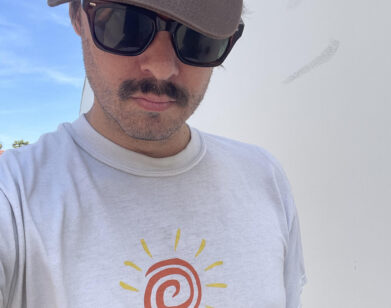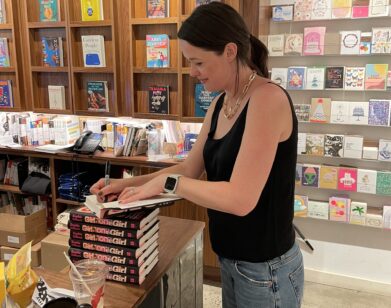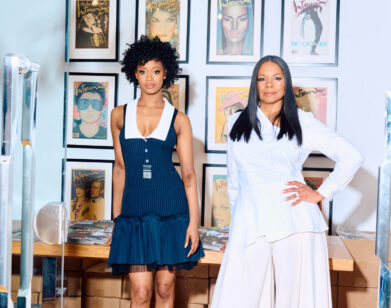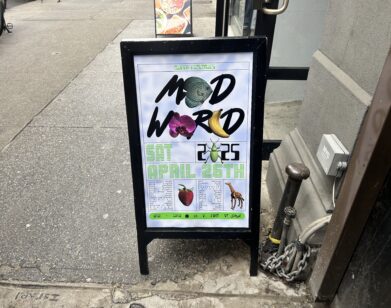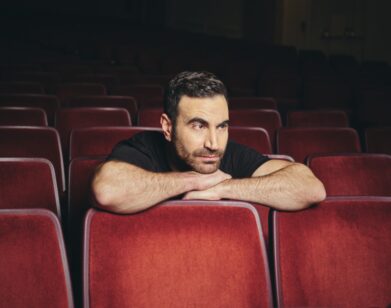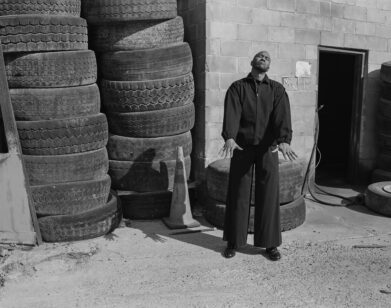Exclusive Video Premiere: ‘One Way Flight,’ Kayvon Zand
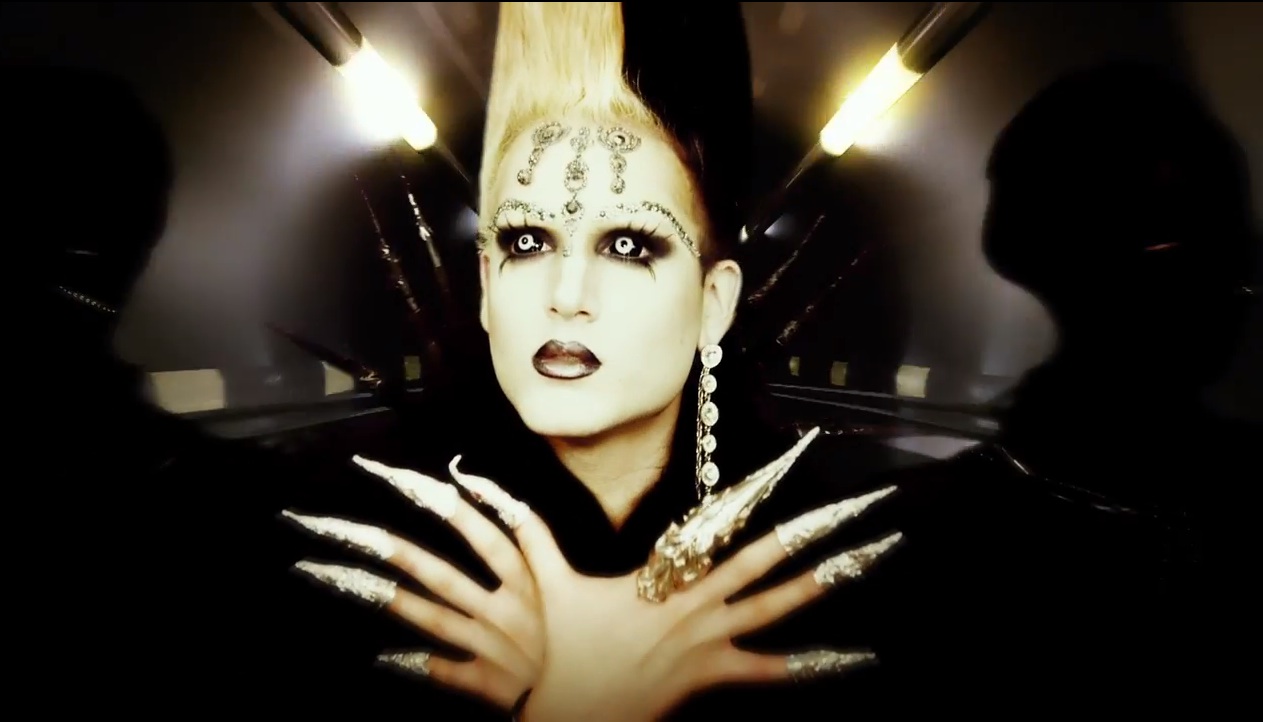
ABOVE: KAYVON ZAND
Get ready to enter the world of ethereal performer Kayvon Zand in “One Way Flight,” his new music video, which we’re pleased to premiere here. On this outer-space voyage overseen by noted actor-director Mike Ruiz, you’ll be joined by a posse of the beautiful people: the Zand Collective, a fluid group of fashionistas and performers. An electro love ballad, “One Way Flight,” was produced by Chew Fu (Lady Gaga, Timbaland, Robyn, Mariah Carey).
A legend in the New York underground, Zand, an androgynous, bisexual beauty, evokes a combination of Elvis Presley, Prince, Boy George, and Marilyn Manson. His look is an integral part of his act and typically consists of a huge pompadour (currently platinum, but formerly jet-black); fantastical colored contact lenses; extreme makeup, which usually includes black lipstick; latex fetishwear; corsets; elaborate get-ups that can range from a wedding dress to dramatic bodysuits; and wings and feathers that whack you in the face when he parades by. Zand is a nightlife celebrity in New York City, and hosts a weekly Friday night party at The Box with the Zand Collective. He’s performed in venues around the world and traveled with party diva Susanne Bartsch to locales like Vienna, Tokyo, Singapore, and Paris. He’s also appeared in several theatrical productions and played a suicide bomber in RuPaul’s 2007 movie, Starbooty.
“One Way Flight” is Zand’s most ambitious music video to date; it was funded by a $12,000 Kickstarter campaign and supplemented by the efforts, fashions, services, and stylings of the Zand Collective’s fans and friends, including designer team The Blonds.
We visited Zand in his midtown high-rise apartment, where he lives with his girlfriend, the statuesque blonde burlesque artist Anna Evans, three friendly little dogs, and two cooing doves. He answered the door in a navy terrycloth bathrobe, fresh out of the shower, handsome in a more rugged way without his signature gothic makeup, outrageous outfits, and insane props. Although he is the leader of his devoted collective of followers, he’s more laid-back than power-mad. Despite his otherworldly appearance, Zand is utterly down-to-earth, charming, and thoughtful.
KAYVON ZAND: You know, New York City felt like home right when I came here. It was the first place where I felt like I could get lost but I could have a family at the same time.
GERRY VISCO: When you first got here, were you single? You came here by yourself or with some friends?
ZAND: I was with a couple friends who had like minds. I moved here with a really good friend of mine. After having been in Europe, I was like, “I can’t go back to North Carolina.” Even though I was in Europe for different reasons, all the wrong reasons, it was those wrong reasons that put things in perspective.
VISCO: And what were those reasons?
ZAND: I was modeling at the time, that’s not who I am. I’m not really someone else’s product.
VISCO: When you came to New York, how did it feel?
ZAND: It felt liberating. I felt like anything was possible, whereas in North Carolina I felt like I had to fill out this multiple-choice answer. Here, my future was open-ended; I felt like it could be whatever I wanted it to be.
VISCO: Did your music career start when you came to New York, or before?
ZAND: I started playing piano when I was three or four. I taught myself. I played orchestra in high school, and I played piano all the time—that was my getaway from North Carolina life. A lot of kids my age were active in sports, but I really gravitated towards the piano. So you could say my music career started then. But as far as being a singer and an entertainer, New York really put everything in perspective. After getting involved with nightlife, I realized there were people who used their bodies and their looks as a way to express themselves artistically. And that was foreign to me—I never really thought that was possible. So between the music, nightlife, and the modeling, I really learned how to see myself from the outside and that really helped me being a performer.
VISCO: Which I think a lot of people aren’t.
ZAND: Well, coming from a Persian family, I picked up on a lot of values. Courtesy and respect are something that I emphasize, even though my appearance may not necessarily coordinate with that culture.
VISCO: They’re doctors, right?
ZAND: Both of my parents were born in Iran. They are both doctors. My father wasn’t involved in my childhood. Just recently I had a DNA test, but he pushed me away and doesn’t want anything to do with me.
VISCO: When did you meet Anna?
ZAND: Anna and I have been together for about four years. We met at the basement of a Goth party. We just hit it off right from the beginning. We just hit it off and had that type of chemistry.
VISCO: Now you live in a sort of square neighborhood. Do you always go out dressed that way, during the day or just the night?
ZAND: Usually my hair is always done up, and I keep my dos for at least a week. Right now, I obviously just got out of the shower. I knew I was doing the interview, so I wanted you to see under everything that there is, to see if that would translate differently.
VISCO: I’m sure I’ve seen you out of your outfits before. You’re just a guy. I think some people get so caught up in an image that they don’t realize that the person has far more than looks.
ZAND: I think that’s kind of a setback of using your looks as your art. People don’t get that you’re not just an art piece—that you are a human being. There’s a certain amount of respect that can be lost with certain people if you don’t look like they do.
VISCO: Well, have people criticized you or tried to make you feel uncomfortable?
ZAND: People will look at you funny because you’re not one of them, and there’s the possibility of some sort of harassment. But just because we don’t look the way they do, we’re human beings, we’re their neighbors, and we both have our family, friends, and dogs.
VISCO: Yeah, of course. But do you feel like some people are really turned on to it—and even if they’re boring, they’re like, “Yay! That’s great”?
ZAND: Sometimes I forget why people are looking at me. Like, even if I were to leave the house now, just wearing a pair of jeans, people will still look at me, probably for different reasons. I think one of the most interesting things about my aesthetic is when they see me out of makeup they say, “Oh, you’re a good-looking guy!” It’s off-putting to them. Because I think that if you wear a lot of makeup or dress up, whether you’re male or female, people think you’re trying to hide something, that you’re not comfortable with who you are, but that’s not true at all. You know, you don’t live in an empty room—you want to decorate your home.
VISCO: But in terms of your looks or appearance, how does that influence your art?
ZAND: It is my art.
VISCO: Has it always been that way, or has it gotten more so?
ZAND: It’s definitely gotten more so. I think having moved to New York City and just having more freedom. You know, this is not America. New York City is like its own country. Where I’m from, North Carolina, is nothing like New York. You could do what I do, but it would be a lot harder because you’d be without a community.
VISCO: What things are important to you?
ZAND: Creating a family. I don’t come from the perfect family. I come from a broken family, to some degree. It’s something I’m lacking, so I’m always wanting it. That’s how the collective happened. It became like a family. Family is really important to me, and someday to have kids. Next, I would say success is very important to me. Not success like making a lot of money or being famous, but being able to do what you love. And to support yourself is very important—you don’t have to be the most famous or the most anything. That brings a lot of happiness in your life when you feel like you have a purpose and your purpose is valued.
VISCO: You’ve gone through the music scene, the fashion scene, but also the nightlife scene. How would you say that fits into your art? It’s a way to make money, but is it also a way to express yourself?
ZAND: What people don’t realize about nightlife is it’s not just nightlife, it’s a lifestyle. It’s the only time we really get to celebrate ourselves. It’s a community. And that’s exactly what it is. So nightlife will always be a community of eccentrics and performance artists. So nightlife will always be a part of my life. The biggest thing that nightlife gave me was a platform to find myself and to find my art and to create. If you look at me from years back to when I came on the scene ’til now, you’ll see growth, a diamond coming out of the rough. And if it hadn’t been for nightlife, I wouldn’t have been able to grow, because where would the platform be? Some people go to school and learn their craft and they do internships, but as a performer and an artist, nightlife is really that university, that platform.
VISCO: What would you like to try that you haven’t done? What are your interests for the future?
ZAND: I want to take what I’m doing to a universal platform, which is what some people would call “making it,” some would call that “stardom,” some would call that “selling out.” For me, I feel like there’s something lacking in our industry. It’s really great that we have a lot of rights for gays and we have a lot of rights for equality, but it seems that the terms are very one-sided. For example, entertainment always really shows where we’re at as a community. You have to look at the ’90s, with Britney Spears and the whole Bush era. The music was really reflective of where we were as a country. I think right now we’re trying to tiptoe around a lot of the issues, like equality. Female entertainers may be able to do this, but I think this say a lot about where we stand truthfully, that we still struggle to value women the same as men. I think that’s why people seem to be uncomfortable with female artists expressing equality and dressing up and being artistic. I feel like as a society we say, “If you’re a woman, as long as you look hot you can kiss another woman and be marketable, but if you’re a guy it’s not the same type of hot.” It’s threatening, because it’s truly sending the message that we’re not equal.
KAYVON ZAND WILL SCREEN “ONE WAY FLIGHT” AT SUSANNE BARTSCH’S THURSDAY NIGHT PARTY THIS EVENING AT MARQUEE, WHICH THE ZAND COLLECTIVE IS HOSTING WITH GUEST DJ CHEW FU.

